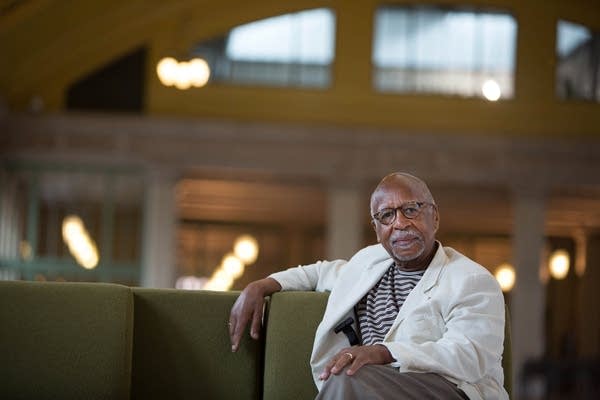Union Depot ceremony honors the men who wore red caps
Go Deeper.
Create an account or log in to save stories.
Like this?
Thanks for liking this story! We have added it to a list of your favorite stories.

In the old days of train travel in St. Paul, a passenger might arrive at the Union Depot with little time but lots of luggage. The passenger would call out "Cap" or "Red Cap" or even "Boy," and a strong, cheerful man in a uniform and a red cap would spring to his assistance.
At a ceremony this afternoon, a room at the restored St. Paul Union Depot will be named in honor of the Red Caps, the men who for $1.25 an hour greeted passengers and helped carry their bags for more than 70 years.
One who remembers the Red Caps is Marvin Roger Anderson, co-founder of Rondo Days in St. Paul. Anderson helped arrange the commemoration of the Red Caps, and he met Tom Weber at the depot to explain why.

"You've got to remember that back when the Red Caps had their heyday, bags did not have rollers on them like they have now," he told Weber. "People would travel for long periods of time. So there would be steamer trunks. There would be very, very large bags, and it was a struggle.
Turn Up Your Support
MPR News helps you turn down the noise and build shared understanding. Turn up your support for this public resource and keep trusted journalism accessible to all.
"So the Red Caps were a group of hardy men who would assist them, and for the service that they provided the traveling public, they got a small salary and they got tips. The tips were the reason that the Red Caps were a unique group of people. Because if you're mean and grouchy, and you're not very pleasant, no one is going to tip you for your service.
"So Red Caps, dining car waiters and Pullman porters long ago realized that if you're going to supplement your salary, you'd better have something else going for you. And that was your personality, your knowledge of the city, your knowledge of the town, and ... any other information that traveler might deem important, for which he or she would say, 'I usually give a quarter; maybe here's 50 cents.'"
Anderson said he sought to have the Red Caps honored in the restored depot "because of the unique role that the Red Caps played in enhancing the reputation of the St. Paul Union Depot."
"In addition to carrying bags," he said, "the Red Caps were responsible for a multitude of tasks. They kept this place looking bright and shiny. They mowed the grass. They shoveled the snow. They sanded. They cleaned all of the bathrooms, they mopped all of these floors. They changed all of the lights. They had over 20 additional tasks that they performed each day. Five hours as a Red Cap, another three or four hours as this general custodian-type person.
"And each one of the things that they did, it seemed to me, would be the face of the Union. If the floor is dirty, you're not going to blame the ticket seller, or the person in the restaurant. You're going to blame the Red Cap. So we thought they should be commemorated in some way."
The Red Caps were mostly African-American men, he said, with a variety of ages and outside occupations. "We have a picture of 36 Red Caps," he said. "We've been able to identify 22 of them. Of those 22, the shortest tenure was 12 years. So they worked 20, 25, 30, 35 years for one employer."
Many of them lived in Anderson's Rondo neighborhood.
"And because they lived in Rondo, we saw these men in a completely different way than they were perceived by the general public," he said. "I can't remember ever calling one of the Red Caps by their first name. They were always Mr. Toliver, Mr. Binner, Mr. Paine, Mr. Galloway. These were the men that were the deacons, the trustees of our churches. These were the men that owned small businesses in our community. Some of them part time worked in small repair stores, as tailors, entrepreneurial-type men.
"And we saw these men in a completely different way, and we had great respect for what the Red Caps, the waiters and the Pullman porters did. ... They built their homes in Rondo, they lived in Rondo, they paid their rent there, we saw them on the street. And they brought that same attitude of humor, professionalism, service, how to be treated, how to treat people, to the surrounding community, and we were all better off."
A ribbon-cutting ceremony is scheduled for 1 p.m. Friday afternoon at the St. Paul Union Depot.



